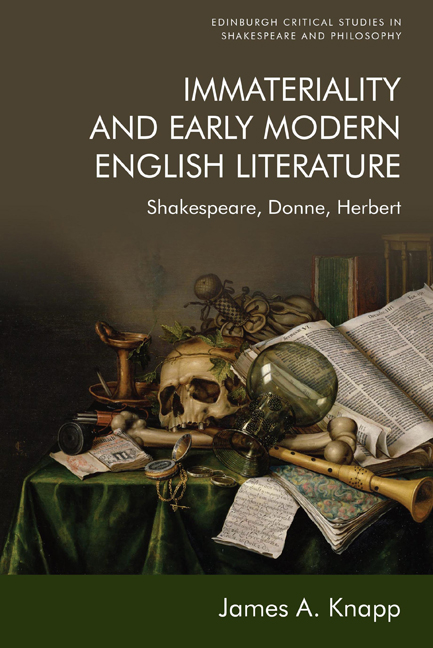1 - Immateriality and the Language of Things
Published online by Cambridge University Press: 10 October 2020
Summary
First of all, and before that any creature was, God made heaven and earth of nothing.
Marginal gloss to Genesis 1: 1, Geneva VersionAt a pivotal moment in the middle of Othello's temptation scene, Emilia offers Iago an object he has long desired. The exchange is evocative:
IAGO How now? What do you do here alone?
EMILIA Do not you chide: I have a thing for you.
IAGO You have a thing for me? It is a common thing –
EMILIA Ha?
IAGO – To have a foolish wife.
EMILIA Oh, is that all? What will you give me now For that same handkerchief? (3.3.298–305)
The ‘thing’ Emilia has for Iago is arguably the most important thing in the play: the storied handkerchief, Othello's symbolically freighted first token of love for Desdemona. Iago, thinking Emilia refers to the one thing she has in the relationship that gives her power – her sexuality – attempts to get the upper hand by humiliating her with a bawdy joke.
The only ‘thing’ she has is common to all women and therefore not particularly valuable to him; Emilia's ‘thing’ is, in the misogynist lingo of the day, ‘nothing’. Anticipating the joke that will come at her expense, and the expense of all women, Emilia interrupts him with ‘ha?’ only to allow Iago to change course and suggest that the ‘common thing’ to which he refers is that it is common for a man to have a ‘foolish wife’. The joke is still on Emilia, but without the demeaning reference to female anatomy. Emilia's surprise ‘is that all?’ confirms that she had a clear idea of where Iago's jab was originally headed, and it would not have been lost on early modern audiences that the interplay between thing and nothing lay at the heart of the joke.
The play on the relationship between thing and nothing in the banter between Iago and Emilia reflects the period's fascination with the difference between material and immaterial things. The elusive concept of immateriality functions in early modern literature in a way similar to how ‘nothing’ does in Emilia and Iago's exchange, for just as ‘nothing’ has no meaning without things, immateriality always operates semantically in relation to materiality.
- Type
- Chapter
- Information
- Immateriality and Early Modern English LiteratureShakespeare, Donne, Herbert, pp. 42 - 60Publisher: Edinburgh University PressPrint publication year: 2020



